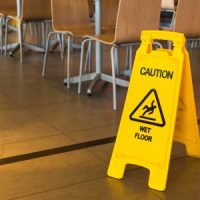Can You Sue If You Fall On A Small Or Minor Imperfection?

We all know that when you fall on someone’s property, the fact that there could be an accident, must be foreseeable. In plain terms that means that the property owner should have known or been able to reasonably foresee that an accident could happen.
Sometimes that’s obvious. If a store leaves a liquid on the floor, or if there is no hand railing on stairs, or if there is no security in a high crime area, it is quite foreseeable that an accident can happen, and so when it does happen, the victim can bring a lawsuit for compensation.
Minor Imperfections on Floor Surfaces
But what about very minor imperfections? We do not live in a perfect world. Floors have bumps and little items that may keep a surface from being perfectly level. Can a victim sue for a relatively minor problem on a floor surface?
That’s exactly what a recent case examined. In the case, the victim’s shoe became snagged on a small divot on one of the steps to a stairwell, and she fell.
The court labeled the problem as a “small aberration,” noted that the imperfection on the floor was only centimeters thick, and kicked her case out of court. The court also noted that literally thousands of people had walked on, or past, this very same area, without incident, and while the fact that previous people have not been injured doesn’t automatically make an area safe, it still was an indicator that there was a lack of foreseeability in the case.
Yes, the victim fell. But the court noted that the fact there is an accident, doesn’t mean that an area is dangerous or that it is foreseeable that a condition may be dangerous.
Possible Harm is Not Enough
The court noted that to be able to sue for a dangerous condition on property, the condition must create more than just “possible harm.” Rather, the potential for harm has to be serious and foreseeable enough that a reasonable person would seek to fix the condition.
Don’t Go it Alone
Note that this case should not be read to mean that you should not seek compensation for your injuries, just because you may have fallen on, or been injured on, a “minor condition.” All it means is that premises liability and slip and fall cases can be difficult cases, and that you should not handle them alone.
In fact, should you handle your fall alone without an attorney, cases like the one described above, will be used by the insurance company to deny you compensation. You may have no idea how to counter that argument, and what the insurance company is saying may, on the surface, seem correct.
But it may not be. Foreseeability is a complex legal analysis, and your injury attorney can help you see if you may have a case to help you get compensation for your injuries.
Don’t analyze your case on your own. Call the Clinton premises liability accident lawyers at Fox Farley Willis & Burnette, PLLC, today.
Sources:
tncourts.gov/sites/default/files/kathy.tino_.opn_.pdf
law.cornell.edu/wex/foreseeability#:~:text=In%20tort%20negligence%20lawsuits%2C%20foreseeability,that%20they%20were%20not%20liable
